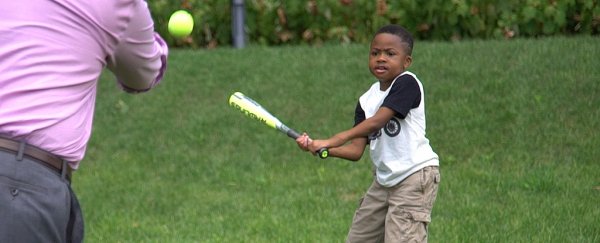Two years after 10 year-old Zion Harvey received a pair of donor hands in a world-first transplant operation, doctors have published on 18 months of the young patient's progress.
Describing the transplant as an overall success, their report also details the risks and challenges involved in what is a revolution still in its infancy, making Zion's progress all the more remarkable.
When he was barely a toddler, Zion contracted a bacterial infection that developed into sepsis. The resulting damage to his hands and feet required them to be amputated.
Zion's kidneys had also failed as a result of his body's efforts to fight the infection, and two years later he received a partial kidney from his mother.
The success of the treatment and the resilience shown by the young recipient and his family made them perfect candidates for attempting something far more risky – a bilateral hand and forearm transplantation.
In 2015, just three months after he was put onto a waiting list, surgeons from Penn Medicine and staff from the Children's Hospital of Philadelphia transplanted a pair of donor hands onto Zion's arms in an operation that required a team of 40 specialists and assistants and took just under 11 hours.
"As of 18 months after transplantation surgery he is able to write and feed, toilet and dress himself more independently and efficiently than he could do before transplantation," concludes the recently published progress report on his case.
Since the first failed attempt at a hand transplant in the 1960s, more than 100 people have had one or two hands transplanted from donors, with varying degrees of success.
In 2000, surgeons in Malaysia transplanted the arm of a recently deceased infant onto her surviving identical twin in treatment of an abnormality.
Now Zion holds the record as the youngest person to have both hands transplanted, and he has taken to his new limbs like a champ.
"He was able to grip a baseball bat, which was something he wanted to do, by about a year, but now he can do it more powerfully with more coordinated motion between the right and the left hand," Sandra Amaral, medical director of the hand transplant program at the Children's Hospital of Philadelphia, told CNN.
Not that it's been an easy ride, or that Zion is completely out of the woods.
"While functional outcomes are positive and the boy is benefitting from his transplant, this surgery has been very demanding for this child and his family," Amaral told The Guardian.
Since the operation there have been eight episodes of rejection, where his body's immune system recognised the tissue as foreign and began to mount a defence.
Adjustments to his anti-rejection medication helped avoid serious consequences, but the long road of physiotherapy and psychological adjustments to his body's new additions have been strenuous. And there is still a lifetime of medication designed to suppress the immune system that would otherwise destroy his new hands.
All of this is while also managing the impact of the transplant on an existing kidney graft. Talk about a tough ride.
And just what does Zion put his can-do attitude down to?
"I owe everything to my mum, because she helped me when I was going through the toughest times in my life," Zion said last year in a documentary by the Children's Hospital of Philadelphia.
The past two years have been a learning curve not just for Zion, but also for researchers keeping up with his progress.
"Childhood brain development appears to be marked by windows of time that are optimised for the acquisition of certain skills," the physicians report.
Even though Zion technically missed that window, his recovery of motor control, nerve growth, and sensation show his brain – and perhaps all young nervous systems – are far more capable of adapting than we assume.
There's no doubt Zion's record will be beaten soon enough as the boundaries on transplants are pushed even further. As we learn more about how the body rejects foreign tissues and advances are made in tissue growth and repair, limb transplants such as these could become far more commonplace.
It's early days still when it comes to the repair and replacement of lost limbs. We hope one day a much older Zion will be able to point to an old news article and say, "Remember when I was the first?"
Take a look at this short documentary by the Children's Hospital of Philadelphia of Zion's first year of progress for your daily dose of happy feelings. Warning, the room will suddenly get very dusty.
This report was published in The Lancet Child & Adolescent Health.
